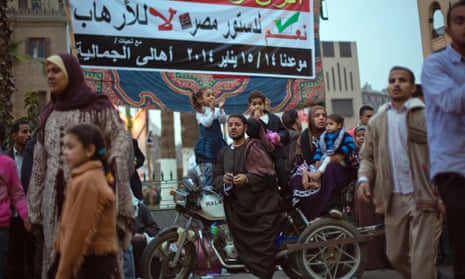A bomb has exploded outside a courthouse in north-western Cairo shortly before polling stations opened for the first time in the post-Morsi era in a constitutional referendum that opposition activists claim they have not been free to campaign against.
Photographs from Imbaba, a working-class district, showed smashed windows and damaged pillars at the front of the local courthouse, apparently caused by a blast. A police official said there were no casualties and blamed it on pro-Morsi extremists trying to put people off voting.
The government and its supporters have positioned the constitution's successful passage as both the only means of creating a stable and democratic state and as an informal ratification of former president Mohamed Morsi's overthrow.
Fearing bomb attacks would discourage people from voting, the army promised to deploy 160,000 troops to secure polling stations.
“Let us all go out and vote with the same fervour we showed on 25 January 2011 and on 30 June, 3 July, and 26 July 2013,” the interim president, Adly Mansour, said on Monday in a speech that tied the poll to dates associated with the downfall of both Morsi and his predecessor, Hosni Mubarak. “[Let's] continue the revolutionary path we have chosen, with a constitution that would act as a springboard for a modern democratic and civil state.”
But opponents of the constitution, which replaces Morsi's Islamist-leaning 2012 version, argue the build-up to the election has been anything but democratic – with dozens of activists allegedly arrested for calling for a no vote. Egyptian streets are filled with thousands of yes posters, with very little space given to the no campaign either on billboards or in the media.
Strong Egypt, a moderate Islamist party that had previously been the only sizeable group to organise a no campaign, has made a last-minute decision to boycott the poll. Officials claimed 35 of their activists had been arrested on the campaign trail and said participation was pointless in the face of such widespread intimidation. The Muslim Brotherhood has long said it will boycott the vote, having rejected the legitimacy of anything that followed Morsi's removal.
“It's a fake process,” said Mohamed el-Baqr, a senior official at Strong Egypt, which opposed Morsi's constitution and later called for his early departure. “The choice on the ballot paper is effectively between a box for yes and a box for handcuffs.”
According to Human Rights Watch at least seven of those arrested face criminal charges. The seven are among thousands of dissenters detained in recent months from across the political spectrum.
Amid the focus on the symbolism of its enactment, the contents of the constitution have been largely ignored. Supporters praise it for largely removing pro-Islamist sections from Morsi's version and for potentially paving the way to better education, healthcare and women's rights. Opponents say it is not the revolutionary document they expected after the removal of two presidents. In particular they fear clauses that variously allow for civilians to be tried in certain contexts in army courts, curb workers' rights and limit religious freedoms to members of the three Abrahamic religions.
The text is opposed by most Islamist groups, with one notable exception: the ultraconservative Salafi Nour party, the second-largest group in Egypt's last parliament. Even though the party previously claimed even Morsi's constitution was not conservative enough, the Nour party has said it will support the new secular-slanted text on pragmatic grounds: to allow it to continue to play a role in the political scene.
“If we said no the constitution would pass by smaller percentage, but it would still pass, and the Nour party would have sacrificed their role in the roadmap,” said Nader Bakkar, the party spokesman. Bakkar nevertheless said the party was not acting out of fear of being added to a crackdown on government critics.
The referendum will be monitored by hundreds of local observers and 83 overseas delegates from Democracy International, paid for by the US government. A spokesman for the group told reporters on Sunday that its “decision to observe should not be considered conferral of legitimacy” on the process. Another US-based group, the Carter Centre, will send only a small delegation after being "deeply concerned" by the "narrowed political space surrounding the upcoming referendum".







Comments (…)
Sign in or create your Guardian account to join the discussion